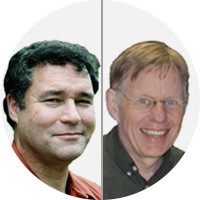The views expressed in our content reflect individual perspectives and do not represent the authoritative views of the Baha'i Faith.
When scientists become curious about the existence of God and spirituality, two questions often come up: “Does anything of any importance lie outside the material realm of the scientist?” and “What attraction might an otherwise reasonable person (we will assume the scientist finds you to be ‘otherwise reasonable’) find in religion?”
Approximately ninety percent of the world’s population describes themselves as having a religious belief system. So what’s the overwhelming attraction in religion? Some people enjoy its social element; the church suppers, the visits to the temple, the connection with friends and relatives, both living and departed. While recognizing the importance of this social aspect, this is not the stuff of which most scientists would make life-changing commitments.
However, scientists can fully understand that one of the most basic purposes of religion is to improve human conduct. The Baha’i writings say
“The purpose of religion . . . is to establish unity and concord amongst the peoples of the world; make it not the cause of dissension and strife.” – Tablets of Baha’u’llah, p. 129
This quality, emphasized so strongly in the Baha’i Faith, even includes the corollary — if religion does not improve human conduct, the absence of religion is preferable. Indeed, all of the major religions hold that there are two basic commandments, or spiritual teachings, that we must to the best of our ability follow: (a) love God; and (b) treat others as we ourselves would like to be treated.
While the first commandment may be difficult for some to intellectually understand, the idea of trying to better practice God’s attributes as declared to the Prophets — such as love, justice, mercy, patience, and so forth — should be clear to all. We know it as the Golden Rule, and it has remained constant throughout all of religious history.
For those scientists who rely on creating testable hypotheses, the Golden Rule can in fact be used to create a few. For example, do people who follow the Golden Rule appear to be happier, more decent, more confident, more satisfied with life, more productive members of society, etc. than those who do not? By the way, formulating this hypothesis as “do people who actually follow the Golden Rule . . .” also serves as an adequate response to questions like “Isn’t Christianity responsible for the Inquisition?” or “Isn’t Islam responsible for global terrorism?”
Despite the name one applies to oneself, a person can only be counted as following a religion if he or she is following the Golden Rule as well. Indeed, the above question need not be asked in the abstract. More particularly, wouldn’t the scientist herself be happier, her family life more congenial, and so forth, if she followed the Golden Rule in her own affairs?
At this point, the intelligent scientist will probably inquire: “What is the correlation between the Golden Rule and religion? Why do I need religion to follow the Golden Rule? Why can’t I be a good person without religion?”
The answer? True religion, when practiced in the right spirit and with similarly conscientious, committed people, produces an effect every scientist can understand – the power of unity. It creates community, a support network and a reliable feedback loop of belief and its effect on behavior. This, of course, makes the lifelong practice of the Golden Rule much easier, simpler and more effective.
The Prophets and Manifestations of God, those Beings (i.e., Krishna, Abraham, Moses, Buddha, Jesus, Mohammad, Baha’u’llah, etc.) that represent the many virtues of God on earth, are our most dramatic and inspirational manifestations of the Golden Rule. Many other lesser examples of the Golden Rule (Mother Theresa, Albert Schweitzer, etc.) have lived inspirational and sacrificial lives because of the strength of their religious beliefs. In fact, that the Prophets’ lives were in such perfect harmony with the Golden Rule is one of the spiritual proofs of their missions. That the Founders of the world’s major religions all claim their inspiration and authority from their relationship with God suggests that right behavior and acknowledgement of God are not unrelated.
Also, while the basic spiritual content of religion (love God, follow the Golden Rule) has remained and will remain unchanged over time, the other thing that the Prophets do is to update the social laws in order to keep up with the needs and exigencies of the age. In practice, this updating of laws cannot proceed successfully without sufficient authority, such as that provided by the Prophet’s relationship with God. With the hindsight of history, both the impact of these changes in social law, and the unique insight of the Prophets in making these changes, should be apparent.
You May Also Like
Comments


















'Approximately ninety percent of the world’s population describes themselves as having a religious belief system'
Europe and other western nations including my own (Australia) are now facing the most serious crisis of belief among the younger generations who are increasingly turning to atheism thanks to heaps of books full of errors composed by Dawkins, Hitchens et al.whose words in turn have disastrous impacts on journalists and then the wider media too and the circle is ...completed in that impressionable young minds are en masse deceived by untruths whose authors laugh all the way to the bank. I know it's true that many Americans, thank God, still believe in God but I wonder what the actual % is nowadays???